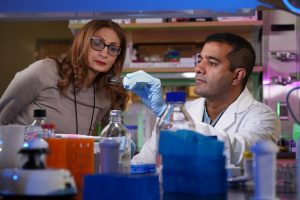Lab Update – Vijay Ramakrishnan, MD
Clinician Scientist joins IU to lead Rhinology research Laboratory of Vijay Ramakrishnan, MD
Professor Vijay Ramakrishnan, MD, joined the Department of Otolaryngology as a surgeon-scientist in 2022 after spending over a decade at the University of Colorado School of Medicine.
 A fellowship-trained rhinologist and endoscopic skull base surgeon, Ramakrishnan’s clinical research centers on understanding patient outcomes in chronic rhinosinusitis (CRS) and using these insights to direct personalized treatment plans that maximize chances for success. He received a seed grant from the IUPUI Institute of Integrative AI to develop a prediction model for surgical outcomes in CRS, using data accumulated from a NIH-sponsored multi-center surgical outcomes trial. He works with experts in the IUPUI Department of Computer and Information Sciences to apply novel “human-in-the-loop” machine learning approaches to achieve better predictions, mitigate bias, and gain trust from end users.
A fellowship-trained rhinologist and endoscopic skull base surgeon, Ramakrishnan’s clinical research centers on understanding patient outcomes in chronic rhinosinusitis (CRS) and using these insights to direct personalized treatment plans that maximize chances for success. He received a seed grant from the IUPUI Institute of Integrative AI to develop a prediction model for surgical outcomes in CRS, using data accumulated from a NIH-sponsored multi-center surgical outcomes trial. He works with experts in the IUPUI Department of Computer and Information Sciences to apply novel “human-in-the-loop” machine learning approaches to achieve better predictions, mitigate bias, and gain trust from end users.
He is the site PI for two new industry-sponsored trials to be carried out with our Clinical Research team and colleagues in the Rhinology Division—1) a phase IV postmarket study on a biologic medication for CRS patients with nasal polyps (AROMA trial, dupixent); and, 2) a phase III study of efficacy and safety for a local steroid-delivery device in unoperated CRS patients (ENLIGHTEN-2) .
Ramakrishnan, whose laboratory research is funded by grants through the National Institute on Deafness and Other Communication Disorders, part of the National Institutes of Health, said his basic science interests have stemmed from these clinical findings. He is investigating the role of the microbiome—the collection of microorganisms, such as bacteria, fungi and viruses, that live within the human body—in regulating mucosal immunity and inflammatory resolution in the respiratory system. In particular, his work examines the actions of specialized chemosensory cells in the nasal cavity that detect bacteria and many other airborne irritants such as allergens and pollutants. He aims to develop a new treatment for inflammatory respiratory diseases through tuning the activities of these cells in order to restore normal function.
